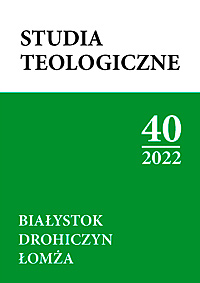Kontrowersje wokół VIII rozdziału adhortacji apostolskiej Amoris laetitia papieża Franciszka. Ocena i studium analityczne z perspektywy czasu
Controversies over Chapter VIII of the Apostolic Exhortation Amoris Laetitia by Pope Francis. Evaluation and analytical study in retrospective view
Author(s): Czesław BochenSubject(s): Christian Theology and Religion, Theology and Religion
Published by: Kuria Metropolitalna Białostocka
Keywords: marriage; blessed Eucharist; penance; divorce; marriage; discipline of Roman Catholic Church.
Summary/Abstract: In 2014 and 2015 took place two synodal assemblies of bishops in Rome on marriage and family. Already during the proceedings, voices were heard about upcoming revolution in the doctrine of the Church. In 2016, in the Year of Mercy Pope Francis signed the apostolic exhortation Amoris Laetitia – The Joy of Love – which was the culmination of these deliberations. The text is divided into 9 chapters and includes 325 numbers. Among them, Chapter 8 provoked the greatest emotions. In it, Francis presented a vision of mercy as an act of pastoral discernment in situations of marital crises ending in divorce and separation. On the surface, this did not seem very different from what John Paul II raised in his adoration Familiaris Consortio. At that time, the Pope allowed people engaged in informal relationships, or divorcees, to receive Holy Communion on the condition that they lived in intimate chastity. Francis went one step further. Without questioning the doctrine of the Church and remaining faithful to it, he gave the green light to those who lived in such arelationship, if they considered their marriages in their past life to be unsuccessful. He did not explicitly announce that such peopleshould be allowed to receive the sacrament of the altar, but he did not question such a possibility either. The condition was the proper recognition of such cases by a clergyman. In the heart of the Church, at various levels, there was an ardent discussion of theologians, bishops and lay people for whom the matters of faith were not indifferent, about what Pope Francis really undertook and what he truly expected. The very titles of publications and pending disputes indicated that the papal document divided public opinion. It seems that there is no unambiguous assessment in the ecclesiastical environment as to the document (despite the unequivocal declaration of the Catholic Church), which will continue to give rise to speculations, because access to Holy Communion will depend on the pastoral evaluation of a grave sin. It does not seem that the papal step in these otherwise difficult and complex matters could cause a disturbance of faith in the Church.To be a community of unity and power in the eternal act of the Creator himself, the Church must face all aspects of human imperfection. Any effort tobring back the lost to the path of truth makes the Church of Christ fully God’s tabernacle, even if it appears to be contrary to the doctrine of faith or impossible to achieve.
Journal: Studia Teologiczne Białystok Drohiczyn Łomża
- Issue Year: 40/2022
- Issue No: 1
- Page Range: 189-232
- Page Count: 44
- Language: Polish

